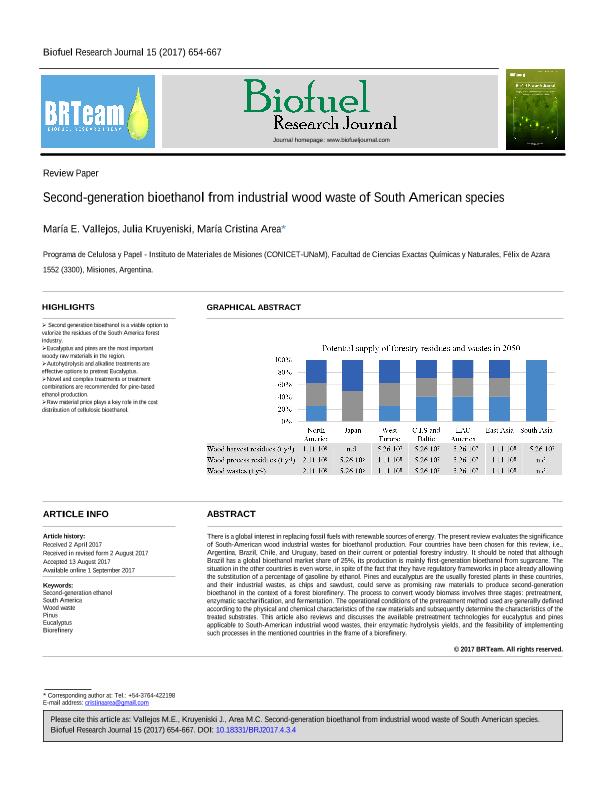Artículo
Second-generation bioethanol from industrial wood waste of South American species
Fecha de publicación:
09/2017
Editorial:
Green Wave Publishing of Canada
Revista:
Biofuel Research Journal
ISSN:
2292-8782
e-ISSN:
2292-8782
Idioma:
Inglés
Tipo de recurso:
Artículo publicado
Clasificación temática:
Resumen
There is a global interest in replacing fossil fuels with renewable sources of energy. The present review evaluates the significance of South-American wood industrial wastes for bioethanol production. Four countries have been chosen for this review, i.e., Argentina, Brazil, Chile, and Uruguay, based on their current or potential forestry industry. It should be noted that although Brazil has a global bioethanol market share of 25%, its production is mainly first-generation bioethanol from sugarcane. The situation in the other countries is even worse, in spite of the fact that they have regulatory frameworks in place already allowing the substitution of a percentage of gasoline by ethanol. Pines and eucalyptus are the usually forested plants in these countries, and their industrial wastes, as chips and sawdust, could serve as promising raw materials to produce second-generation bioethanol in the context of a forest biorefinery. The process to convert woody biomass involves three stages: pretreatment, enzymatic saccharification, and fermentation. The operational conditions of the pretreatment method used are generally defined according to the physical and chemical characteristics of the raw materials and subsequently determine the characteristics of the treated substrates. This article also reviews and discusses the available pretreatment technologies for eucalyptus and pines applicable to South-American industrial wood wastes, their enzymatic hydrolysis yields, and the feasibility of implementing such processes in the mentioned countries in the frame of a biorefinery.
Palabras clave:
Second-Generation Ethanol
,
South America
,
Wood Waste
,
Pinus
,
Eucalyptus
,
Biorefinery
Archivos asociados
Licencia
Identificadores
Colecciones
Articulos(IMAM)
Articulos de INST.DE MATERIALES DE MISIONES
Articulos de INST.DE MATERIALES DE MISIONES
Citación
Vallejos, María Evangelina; Kruyeniski, Julia; Area, Maria Cristina; Second-generation bioethanol from industrial wood waste of South American species; Green Wave Publishing of Canada; Biofuel Research Journal; 4; 3; 9-2017; 654-667
Compartir
Altmétricas




